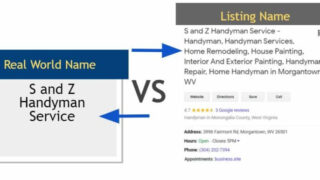Keyword stuffing has been a hot topic in the Google My Business world for a long time. Keyword stuffing or “adding descriptors” to your name on Google My Business is when someone adds words to their business name on GMB that aren’t part of that business’s actual legal name.
Here’s an example:

We know beyond a shadow of a doubt that keywords in the business name impact ranking directly and dramatically. Here’s an example of the ranking impact.

We also know that Google historically and presently takes action on GMB profiles that engage in adding “unnecessary” or “unreasonable” descriptors that don’t match the business’s real-world name. I analyzed the impact of reporting 50 examples of keyword stuffing, and in that study, Google took action on 40% of them. Some businesses were given a soft suspension, and others were given a hard suspension.
You can read more on the difference between those two types of punishment in this guide to GMB suspensions.

Keyword stuffing’s impact in the real world
What we have been observing over the last year is that some verticals, but mainly law firms, are experiencing what I refer to as a local SEO phenomenon. Law firms are legitimately re-branding in order to get keywords into their GMB name so they can experience the ranking benefit without the negative impact of Google removing the keywords or suspending their listing.
According to the GMB guidelines, companies should “Represent your business as it’s consistently represented and recognized in the real world across signage, stationery, and other branding. Your name should reflect your business’ real-world name, as used consistently on your storefront, website, stationery, and as known to customers. Accurately representing your business name helps customers find your business online.”
In my experience over the last year, Google is ok with the GMB name as long as it matches your website logo and in-store signage.
To give you a sense of how many law firms are doing this, just perform a search for “Personal Injury Attorney” in any major city in the US. Check out this example from the San Diego market. Google is ok with the format of these firms’ names due to the fact that they match the logo on the website and signage.


The major problem I am starting is that this tactic can cause some branding issues, and this isn’t exclusive to law firms. Check out this result for “Tree Services in Raleigh.” Seth Godin often talks about “Remarkable” businesses. How are you supposed to become remarkable and stand out in the mind of your customers when everyone has a similar name?

If you had to choose between higher rankings or a memorable business name, which one would you choose? Answer that question now and then again after you read the next section.
The ranking power diminishes when everyone is doing it
Did you choose higher rankings over a memorable business name? Consider this. The other issue that I am observing, and this is a very important point to remember, is that once you get to a point where the entire market is adding descriptors to their name, the ranking power that the keywords provided will diminish. So now you are left with a branding mess and no ranking benefit. We are already seeing this happen in several markets.
Why We Care
Keyword stuffing as a ranking factor has been a thing for over a decade. If this was something that Google was going to fix, I think we would have had a solution by now. I think that part of the challenge for Google is that they just don’t understand why it’s an issue. We have found that Google doesn’t prioritize unnecessary descriptors because their presence is not harmful to users. Although it might be manipulating the search results, this doesn’t seem to be something Google is concerned about fixing.
If you find yourself in a position where you are advising a business owner on whether or not they should be rebranding to add keywords to their name, I would consider the pros and cons of going down that road. As long as you do that, whatever you decide to do, you can take comfort in the fact that you took the time to explain the benefits and potential risks. This, in my opinion, is something that separates good local SEOs from great local SEOs.
Here are the pros and cons of rebranding to get keywords into your GMB name:
Pros:
- You will experience a ranking boost
Cons:
- Competitors can still edit the business name, even if you do the proper rebranding process
- Branding issues
- The ranking benefit goes away once everyone in your market is adding keywords to their name
The post The real-world impact of keyword stuffing in Google My Business appeared first on Search Engine Land.



